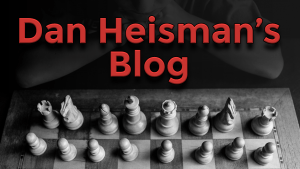Q&A with Coach Heisman May 30, 2014
1."If we partition your chess strength (or improvement) into two broad classes, what portion is knowledge (opening moves, endgame positions, tactical positions, principles) vs. abilities/skills (analysis, evaluation, time management, criticality assessment, stamina, will-power, determination, perseverance, ability to tolerate and learn from losses, etc)?"
Several viewers on the channel answered. Their answers ranged widely but, on average, came in about where I think the answer lies, which is roughly 2/3 ability and 1/3 knowledge. Both are critical, of course, and neither can be neglected. See both columns: Traits of a Good Chessplayer and Every Good Chessplayer...
2. "Safety-Safety = boring-boring"
Wow! That's not even close to the truth. When you purposely sacrifice and get compensation, by my definition that's safe; it's just blundering and losing material for nothing (or inadequate compensation) that's not safe. So in that sense almost all GM moves are safe and you can't call all GM games boring. I think you might be confusing "safe" with "passive" or some other boring ways of playing.
You can be as aggressive as you want (and that's the way I generally play) while still being safe. The point is that weaker players need to think safety first and everything else second or they will just lose. But if they do play safe, they can certainly play agressively and have interesting, fighting games. Always play with confidence, aggression, and respect for your opponent's moves and ideas.
3. "Radjabov has a better record against Carlsen than Nakamura."
The first words out of my mouth were "I think everyone has a better record against Carlsen than Nakamura" and when I got to that point in reading the channel information the first response by a viewer on the channel had been "I think everyone has a better record against Carlsen than Nakamura" 
4. "How do I get better at X" where X is planning, endgames, etc.?"
The best way is rarely from reading books, although the occasional really good one can be extremely helpful (I authored 11 books; if I didn't feel that way I would not have taken the time, since chess authors are hardly JK Rowling on the compensation side). I think the best way to learn most things is to play slow games and to analyze them - and other games/positions - with very strong players. Those strong players don't have to be your coach. They could be a big brother, a friend at your local club, or even an enemy at your local club. But very few things beat analyzing with strong players.
That reminds me of the story I heard about Mig Greengard. It went something like this: Mig was assigned out of college to work in Buenos Aires. He did not speak the language, so after work he went to the strongest chess club in the city and hung out with the international (GM and IM) players, most of whom spoke English. He analyzed with them, ate meals with them, and let them make fun of his play. Result: in a couple years his rating rose from 1900 to 2300. Makes sense to me.
5. "I know you hate questions about openings..."
That's not a fair way of considering the subject. I like all types of questions, including ones on the opening. Unfortunately we do get a disproportionate number of questions about openings on the show, and most are of the variety "What do you think about the X opening?", which hardly allows for an interesting answer for most of the viewers, who don't play X. Moreover, it enhances the myth that if a weak player finds the right opening it can dramatically improve his playing strength.
There are many, many interesting questions about the opening and I love every one of those; the opening is a rich topic.
6. It's only peripherally from the show but "What are the three columns you wrote on chess improvement that are only in your book A Guide to Chess Improvement and will not be published online?"
- Ask the Right Questions
- The Three Types of Chess Vision (tactical, board, visualization), and
- Is It Safe? Quiz
7. "Is 29 too old to start playing in tournaments?"
No...tournaments are fun! Is 29 too late to start having fun? I recall the story of a 90-year-old gentleman who heard he needed a proactive mental activity as he aged, so he took up tournament chess. His first rating was in the 900-1000 range but, by age 93, he was up to 1300. Wetzell wrote the book Chess Master at Any Age. Moreover, I think your question assumes that at 29 you should only begin tournaments if you think you can become a great player; what if you're just playing to have as much fun as possible? The sooner you start, the more fun you will have. See my column Chess, Learning, and Fun.
8. "What's a good opening for beginners?"
First, playing gambits to get the initiative is almost cost free since most beginner opponents can't win even if the attack fizzles and the opponent is left with a "free" extra pawn. Second, I agree with most instructors that just playing 1.e4 and getting into tactical fights and learning tactics is the way to go. Postponing clashes of the pieces with openings like the King's Indian Attack doesn't solve the problem, as the pieces will eventually clash anyway, so why not learn the rough-and-tumble as quickly as possible? That's the kind of tactical ability that most helps you improve faster anyway.
9. "Are there any books you plan to write in the future?"
Thanks for asking! After all the work getting the second editions of Looking for Trouble (now in Forward Chess format, too) and The Improving Chess Thinker updated, I have no immediate plans. I actually have multiple publishers interested in making our Chess.com group's Dan Heisman Learning Center forum "My Last Lesson with Dan" into a book since the entries are so interesting and instructive. However the material is currently way too small to put into book form, so until we get many, many more entries, that can't be seriously contemplated.
Due to a scheduling conflict, the next show will be Friday Jun 20 (instead of Jun 13). Then we will return to schedule on Friday Jun 27, at 5-6:30 PM ET as always.






